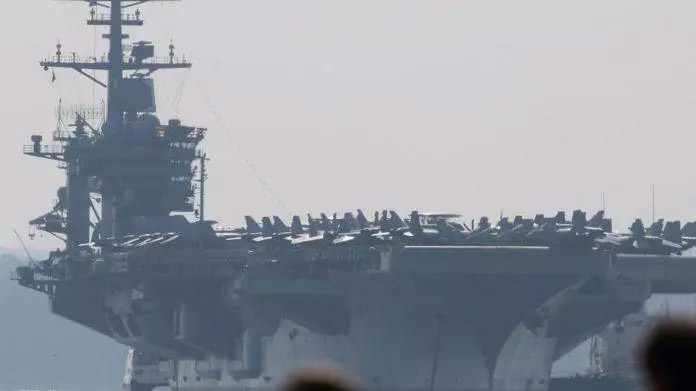Indian Navy Veterans Slam ‘Childish’ US Response To Roosevelt Ship Incident
06 April, 2020
New Delhi: The former top brass of the Indian Navy have slammed the way the US defence authorities have handled the coronavirus outbreak aboard the American aircraft carrier USS Theodore Roosevelt.
In one of the biggest developments in the world of naval affairs, acting US Navy secretary Thomas B. Modly has resigned following the uproar over the coronavirus outbreak aboard the ship and subsequent sacking of its Captain Brett E. Crozier.
The almost public war of words between Modly and Captain Crozier, who has now tested positive for Covid-19, has engulfed the US Navy in a clear command crisis and a public relations disaster.
It all began with news on 25 March of three American Navy sailors aboard USS Theodore Roosevelt — then in the Philippine Sea — testing positive for coronavirus. The three were among a 5,000-strong crew aboard the Nimitz-class nuclear-powered aircraft carrier.
The virus quickly spread, as expected, and more than 200 of the crew have tested positive until now.
The New York Times reported that Modly’s departure may help cauterise a string of self-inflicted wounds that began last week, after The San Francisco Chronicle published a letter, in which Captain Crozier pleaded with the Navy to help contain the virus.
Navy Veterans Slam Captain, Acting Secretary
While Captain Crozier has been portrayed as a hero, retired chiefs of the Indian Navy feel that he is to be blamed for the saga as much as the then acting US navy secretary.
“The captain should have followed the chain of command. He was well within his rights to highlight the issues he faced but there is a procedure and way to do this,” former Navy Chief Admiral Sunil Lanba told ThePrint.
Speaking about the sacking of the captain by Modly, the former chief who retired last year said the acting secretary was also wrong in sacking the captain without any probe.
“There should have been a proper investigation into this incident before the captain was fired,” he said.
“The whole incident has taken a wrong direction,” Vice Admiral Vinod Pasricha, who has commanded the now decommissioned INS Viraat, told ThePrint. “The captain had no business in writing that letter to so many people and thereby leaking it to the media. There is a chain of command that one has to follow.”
He said the navy secretary went one step further by sacking him without any probe. “Both were childish in dealing with the entire issue. In the bargain, the image of the US navy has been hit.”
Pasricha said the captain had every right to fight but the fight should have been within the ranks itself.
“The British always called the navy the silent navy and that is how it is supposed to be. If I have a problem as the captain of the ship, I will raise it to my superiors,” said the naval veteran. “If he or she disagrees I would request him to raise to the next in command and so on.”
‘Shows Lack Of Leadership’
Vice Admiral Pasricha said the fact that the captain of the nuclear-powered aircraft carrier came under pressure and wrote this letter to so many, which got leaked, showed lack of leadership ability.
He said while the captain may be a toast on social media and elsewhere, the lack of leadership quality has revealed itself.
The retired officer also blamed the US government for taking the whole coronavirus issue lightly and allowing the vessel to make port calls to Vietnam in the midst of the pandemic.
The aircraft carrier had made a port call at Vietnam two weeks before the first case of coronavirus had been reported on board.
‘A Chain of Command Should Have Been Followed’
Former Navy Chief Admiral Arun Prakash, a 1971 war hero, pointed out that the US chain of command had not reacted instantly to a developing crisis as was shown in 2017 when two US Navy vessels collided with other ships.
“The probe had then revealed that the high-tech systems on board were not working and the men were tired due to overwork,” he told ThePrint. “This was mentioned by the captain in the chain of command. However the system was non responsive.”
Having said this, Admiral Prakash underlined that the captain of USS Theodore Roosevelt should have followed the chain of command rather than writing to everyone.
“There is a carrier strike group commander, a Rear Admiral rank officer, on board the aircraft carrier. There is a chain of command to be followed,” he said. “Even in the MoD here, there are rules which specify how many days one should wait before escalating it to the next level and so on. Roosevelt was a crisis and hence even if there is a time lapse to be maintained, it will not be applicable.”
The officer added that the captain should have been more discreet in writing the letter and should have sent it through their internal secure communication.
At the same time, Admiral Prakash said the acting navy secretary was equally wrong in badmouthing the Captain in front of his crew and calling him all kinds of names.
He also said the honourable way would have been for the captain to tender in his resignation if he really felt that the system was letting him down, rather than leaking the mail to the media. “His resignation would have rung alarm bells in the Pentagon,” he said.
Courtesy: Opera News/ theprint.in

